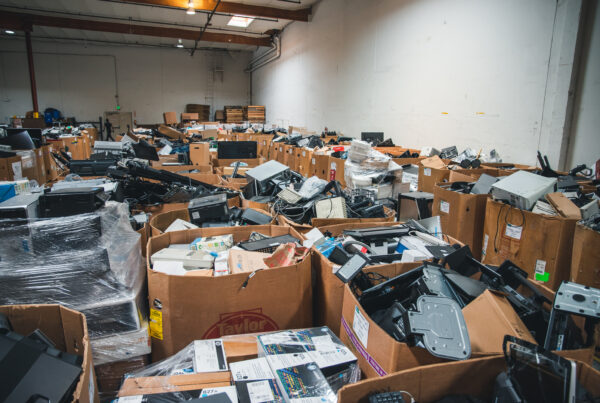Michigan, a state known for its diverse landscapes and thriving industries, is no stranger to the growing challenge of electronic waste. As technology quickly advances, businesses and consumers alike find themselves grappling with the proper disposal of obsolete devices. Additionally, e-waste regulations in Michigan are complex, making the task of proper e-waste removal more challenging. Mishandling e-waste entails environmental, financial, and legal implications that leave organizations feeling overwhelmed and uncertain.
However, despite the challenges, there is an opportunity to redefine our relationship with e-waste. There is a way to transform a problem into a solution and make a lasting, positive impact on our environment and communities. Michigan, in light of that, has risen to the occasion. Michigan’s e-waste regulations and initiatives promote responsible, clear paths to e-waste management. These efforts form a comprehensive framework that guides businesses and individuals in navigating the ins and outs of e-waste disposal. And, also importantly, they foster a culture of sustainability and social responsibility.
Table of Contents
- E-Waste Management Initiatives in Michigan
- New Michigan E-Waste Regulation Law
- Data Security Measures before Recycling
- Hypothetical Scenarios of E-Waste Disposal by Businesses
- Partnering with Human-I-T for Your E-Waste Management Needs
- Fill Out This Form for Help Navigating E-Waste Regulations in Michigan
E-Waste Management Initiatives in Michigan
Michigan’s commitment to responsible e-waste management is evident in the multitude of innovative programs and initiatives implemented across the state. These e-waste regulation efforts, significantly, tackle the immediate challenges posed by electronic waste and lay the foundation for a more sustainable future. By engaging manufacturers, consumers, and recyclers, Michigan created an ecosystem promoting the reuse, recycling, and proper disposal of electronic devices.
Michigan Electronic Waste Takeback Program
At the forefront of Michigan’s e-waste management initiatives stands the groundbreaking Michigan Electronic Waste Takeback Program. Established in 2008, this visionary program represents how e-waste regulations in Michigan are firmly rooted in the principle of Extended Producer Responsibility (EPR). Manufacturers are obligated to set up a takeback system that allows consumers to return their electronic devices at no cost. Initiatives like this make responsible e-waste disposal accessible and convenient for all. This encourages the reuse of electronics and ensures the proper recycling of unwanted devices. It also prevents these devices from ending up in landfills and contributing to environmental degradation.
Extended Producer Responsibility
Michigan’s Extended Producer Responsibility (EPR) and Product Stewardship is a mandatory type of product stewardship requiring producers to take responsibility for the post-consumer management of their products and packaging. This responsibility includes designing, managing, and financing programs for the end-of-life management of their products as a condition of sale. As such, the Michigan Electronics Takeback Program aligns with these principles. It states, “Manufacturers shall establish a convenient takeback program for consumers to return the devices to the manufacturer or their representative at no charge.”
Michigan’s e-waste regulations adhere to the key elements of EPR legislation outlined by the Product Stewardship Institute. Under this framework, government, retailers, and consumers all play crucial roles in the success of e-waste management. The government is responsible for setting and enforcing performance goals and standards, maintaining a competitive marketplace, and supporting industry programs through procurement and public education. Retailers are to only sell brands within a covered product category made by producers participating in an industry program. They also must provide information to consumers on how to access these programs.
Consumers, in turn, have a responsibility to reduce waste and reuse products. They should also utilize take-back and collection programs, and make informed purchasing decisions.
By embracing these principles of EPR and Product Stewardship, the e-waste regulations in Michigan ensure that manufacturers provide easily accessible options for consumers to reuse and recycle their unwanted electronics. Doing so prevents devices from ending up in landfills and contributing to environmental degradation.
Registration requirements for manufacturers and recyclers
To maintain accountability and transparency, Michigan has implemented rigorous registration requirements for manufacturers, recyclers, and collectors. The Electronics Takeback Law mandates that “Manufacturers are required to annually register each of the brands of covered devices with the state of Michigan.” Additionally, they must also “provide a website or other information about the established takeback program” to ensure consumer awareness.
Furthermore, “Recyclers must annually report the amount of recycled material and the locations of recycling facilities that processed covered devices” and “comply with laws about requiring environmental, health and safety plans for the recycling facility.” Collection sites, while not currently required, are encouraged to “register and to share their facility locations” with the state. These requirements allow for effective monitoring and oversight of the e-waste management process. Subsequently, this ensures all stakeholders adhere to the state’s standards and that consumers have access to the necessary information to responsibly dispose of their electronic waste.
The list of Registered Recycling Facilities
Michigan state officials maintain a comprehensive list of registered recycling facilities, serving both domestic and commercial sources. This list is updated six times a year. Hence, it provides a valuable resource for businesses and individuals seeking to dispose of their e-waste responsibly. By referring to this list, stakeholders easily locate certified facilities that adhere to Michigan’s stringent e-waste regulations, ensuring that their electronic waste is handled properly.
The list of Registered Recycling Facilities includes common brand names such as HP, Acer, Google, Meta, and Dell as well as many others you may not be aware of. You can find the comprehensive list here.
Materials Management Planning
Michigan’s commitment to sustainable e-waste management extends beyond individual programs and initiatives. Thus, the state has recognized the need for a comprehensive Materials Management Planning approach. New laws necessitate a shift from disposal to recycling and composting. Jurisdictions are encouraged to collaborate and work together to divert waste from landfills. Michigan’s Department of Environment, Great Lakes, and Energy (EGLE) providing training and outreach materials to support these efforts.
Rural Electronics Recycling Grant Program
Recognizing the unique challenges faced by rural communities, Michigan has introduced the Rural Electronics Recycling Grant Program. This innovative initiative, backed by $250,000 in available funding, aims to support the establishment of permanent recycling collection sites in underserved areas of the state.
As highlighted by EGLE, the grant opportunity “will support ongoing access to proper electronics recycling in the rural areas of the state” and can be used “to support electronics collection events, to establish new permanent collection locations, to support the collection, handling and proper recycling of consumer electronics from operating collection locations in defined rural areas of the state, and to establish hub-and-spoke collection programs from small collection locations.” By supporting recycling initiatives in these regions, Michigan is undoubtedly bridging the gap, ensuring all residents have access to responsible e-waste disposal options.
To further enhance accessibility and transparency, Michigan has developed the Electronic Waste Recycling Facilities Web Map. This interactive tool provides a visual representation of all registered electronic waste recycling facilities across the state. Furthermore, the web map makes it easier for businesses and individuals to locate the nearest facility and plan their e-waste disposal accordingly.
New Michigan E-Waste Regulation Law
As Michigan continues to refine and strengthen its e-waste management framework, the state is also looking towards the future, embracing innovative solutions and forward-thinking legislation.
In 2023, Michigan took a significant leap forward with the passage of an eight-bill package aimed at revamping the state’s waste system. This groundbreaking legislation addresses the immediate challenges posed by electronic waste and sets the stage for a more sustainable and efficient waste management ecosystem.
The new laws introduce sweeping changes to solid waste materials utilization facilities, including materials recovery facilities (MRFs) and compost operations. These changes unquestionably streamline processes, increase efficiency, and promote the adoption of best practices in waste management.
One of the most exciting aspects of the new legislation is the introduction of a category for “Innovative Technologies.” This forward-thinking provision is aimed at scaling new ideas and fostering the development of cutting-edge solutions in the e-waste management space. By creating a dedicated category for innovative technologies, Michigan is actively encouraging entrepreneurs, researchers, and industry leaders to push the boundaries of what is possible in e-waste recycling and disposal. Undeniably, this drives economic growth and job creation and positions Michigan as a national leader in sustainable waste management practices.
The new laws also prioritize funding for diversion practices, recognizing the importance of keeping electronic waste out of landfills and redirecting it towards more sustainable end-of-life options. By investing in the improvement of MRFs, increasing access to collection programs, and promoting community outreach, Michigan is creating a robust and accessible e-waste management ecosystem.
These initiatives ensure that businesses and individuals have the resources and knowledge they need to responsibly dispose of their electronic devices, regardless of their location or socioeconomic status.
Data Security Measures before Recycling
When it comes to recycling your electronic devices, ensuring the security of your personal and business data is crucial. Follow these steps to protect your information throughout the recycling process:
- Back up important data:
- Identify and save any important files, photos, or documents you wish to keep.
- Store these files securely on an external hard drive, cloud storage, or another device.
- Delete data from all storage devices:
- Perform a factory reset on your devices to erase surface-level data.
- Use professional data erasure software to overwrite data multiple times, making it virtually irrecoverable.
- For highly sensitive information, consider physically destroying the storage devices.
- Remove portable media:
- Eject and remove any CDs, DVDs, or memory cards from your devices.
- Ensure these portable storage units are securely erased or physically destroyed.
- Verify data removal:
- Double-check that all personal and business information is successfully removed from your devices.
- Consult with a professional data security service if you require additional assistance or peace of mind.
By following these data security measures, you can confidently participate in Michigan’s e-waste recycling initiatives, knowing that your personal and business information is protected. Embrace responsible e-waste management practices and be vigilant in safeguarding our digital lives while contributing to a more sustainable future.
Michigan’s e-waste regulations focus on data security and set a powerful example for other states to follow by prioritizing both environmental responsibility and the protection of personal information,
Therefore, as we align ourselves with Michigan’s e-waste management framework, we move closer to a world where e-waste is no longer a burden. It’s an opportunity for positive change.
Hypothetical Scenarios of E-Waste Disposal by Businesses
To better understand how Michigan’s e-waste regulations and initiatives translate into real-world applications, let’s explore two hypothetical scenarios. Each demonstrates how businesses can align their e-waste disposal practices with the state’s requirements.
Scenario 1: IT Company Retiring Old Computers
An IT company in Detroit regularly updates its computer systems, resulting in a significant amount of electronic waste. To properly dispose of these old computers, the company:
- Leverages Michigan’s Extended Producer Responsibility (EPR) law and organizes take-backs with the device manufacturers.
- Implements a rigorous data erasure protocol, including data backup, factory resets, and professional data erasure software.
- Physically destroys storage components for devices containing highly confidential information.
By adhering to Michigan’s EPR law, organizing manufacturer take-backs, and implementing stringent data erasure measures, the IT company demonstrates its commitment to environmental sustainability and data security. Thereby, it aligns perfectly with the state’s e-waste regulations.
Scenario 2: Rural Hospital Replacing Outdated Medical Equipment
A rural hospital in northern Michigan is modernizing its medical equipment and must properly dispose of the outdated devices containing sensitive patient data. The hospital:
- Applies for Michigan’s Rural Electronics Recycling Grant Program to secure funding for a permanent recycling collection site.
- Implements rigorous data sanitization protocols, including removal of storage media and professional data erasure techniques.
- Partners with a certified e-waste recycling facility specializing in handling medical equipment and guaranteeing secure data destruction.
By taking advantage of the Rural Electronics Recycling Grant Program and establishing a permanent collection site, the hospital aligns its practices with Michigan’s e-waste regulations while contributing to the expansion of recycling infrastructure in underserved areas.
These scenarios showcase how businesses can effectively navigate Michigan’s e-waste regulations by leveraging state programs, adhering to data security best practices. In this case, it also shows how they can actively participate in the responsible disposal and recycling of electronic waste. As more businesses follow suit, Michigan moves closer to creating a sustainable, secure, and equitable future for all its residents.
Partnering with Human-I-T for Your E-Waste Management Needs
Human-I-T is a social enterprise committed to reducing e-waste, bridging the digital divide, and promoting digital inclusion. With a state-of-the-art e-waste refurbishment center located in Michigan, Human-I-T is well-equipped to handle your company’s electronic waste while ensuring compliance with all relevant state regulations.
Our comprehensive e-waste services include secure data destruction, environmentally responsible recycling, and refurbishment of devices for sale in our online store and donation to underserved communities. Hence, by partnering with Human-I-T, your business meets its legal obligations and contributes to a more sustainable and equitable future.
We serve a wide range of organizations, including corporations, government agencies, schools, and healthcare providers. Our team of experts works closely with you to develop a customized e-waste management plan that meets your specific needs and aligns with Michigan’s regulatory framework.
Take the first step towards responsible e-waste management and make a positive impact on the environment and your community. Contact Human-I-T today to learn more about our e-waste services. We can help your business navigate Michigan’s e-waste regulations with ease.
Together, we create a more sustainable and equitable future for all.






